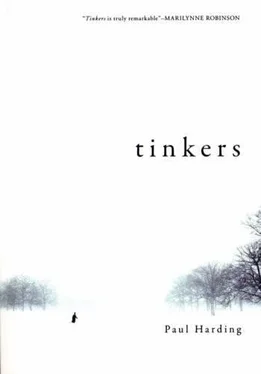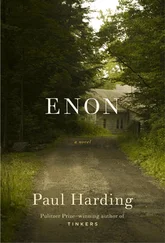Domestica Borealis: 1. New Year's morning we watched crows collect tinsel for their nests from the discarded Christmas trees along the road. 2. We watched the leaded glass of our windows knit frost into lace. 3. We lashed fishing line to playing cards and raised a house. 4. After Sunday dinner we changed into our sackcloths and threw crab apples at our younger cousins. 5. We drew straws and flipped coins and played Chinese checkers. 6. When it came time to pick bedrooms, we arm-wrestled for choice. The winner chose the room resplendent with crowned kings, queens bestowing benedictions, mocking jokers, jacks with sly smiles. The loser was stuck with a more modest space of twos and fours and sevens, although we were all smitten with the glossy clubs and spades, the livid diamonds, the hearts so bloody red, they seemed nearly to beat.
George awoke for the last time forty-eight hours before he died. He had been unconscious for two days. This was when he understood the situation and needed to tell people things. There was $2,400 in cash hidden in his workbench downstairs. The Simon Willard banjo clock on the wall was worth ten times more than he'd ever told anyone. There was an inscribed first edition of The Scarlet Letter in a safety-deposit box. He loved everyone dearly.
He roused at a time when the last of his body's major systems had begun to stop. His lungs were full of liquid and he felt like he was drowning. When he tried to speak, he could only make noises that sounded like a rusted pulley turning over a dry well. He looked from person to person around his bed for help. This upset his family, particularly Marjorie, his sister, who cried and looked at his wide eyes and said over and over, He looks so scared. He was like my daddy, he looks so scared, he was like my daddy-until she was taken to the kitchen by one of the cousins. A grandson said, just relax, Gramp, panicking just makes it harder to breathe. He gasped more, gasped faster. The grandson said, I know how it feels, Gramp; it happens when I get an asthma attack. I get scared, too, scared I can't breathe, but I just relax and I can always breathe. It happens to me, too. He looked at the young man, someone he knew and trusted. As his eyes closed, he still heard the gurgling and felt the nerveless weight of his body, but also felt himself falling away from it, as if he were lying just beneath the contours and boundaries of something that had formerly fit him perfectly, and which to fully inhabit meant to be in this world. It was as if he lay faceup just beneath the surface of water. Voices rose and fell and the sounds of bodies in motion thumped above him. All seemed increasingly foreign, other. He just made out someone saying, No way, no way; I'm keeping him under now.
Choose any hour on the clock. It is possible, then, to conceive that the clock's purpose is to return the hands back to that time, a time which, from the moment chosen, the hands leave and skate across the rest of the clock's painted signs and calibrations and numbers. These other markings on the face become irrelevant in themselves; they are now simply clues pointing in the direction of the chosen time. It is then possible, too, to conceive of the clock's gears and springs as each having its own intrinsic function, but within a whole mechanism, the larger purpose of which is to return to the chosen time. In this manner, the clock resembles the universe. For is it not true that our universe is a mechanism consisting of celestial gears, spinning ball bearings, solar furnaces, all cooperating to return man (and, indeed, what other, unimagined neighbors of whom we are ignorant!) to that chosen hour we know of from the Bible as Before the Fall? And as an ignorant insect crawling across the face of that clock, who sees not the whole face, the full cycle of numbers, the short hand and the long (which pass in his sky with predictable orbits, cast familiar shadows, offer reassurance through their very repetitions, but which, ultimately, puzzle and beg for the consideration of deeper mysteries), but who merely treads over the surface which hides the gear train and the springs without any but the most indirect conception of what lies beneath, so does man squirm and fret on the dusty skin of our earth, ignorant of the purpose of the world, indeed, the cosmos, beyond the fact that there is one, assigned by God and known only to Him, and that it is good and that it is terrifying and that it is ineffable and that only rational faith can soothe the desperate pains and woes of our magnificent and depraved world. It is that simple, dear reader, that logical and that elegant.
– from The Reasonable Horologist,
by the Rev. Kenner Davenport, 1783
One January night in 1972, Howard's attention strayed from the book he was reading in bed. He imagined his own sleeping form, imagined that if one could pan back from peaceful face to bird's-eye view, one could see the supine figure floating not upon the vastness of a dark ocean of sleep but reposing in the vastation itself, the soul or whatever name one cared to give it divested of the body, so that what seemed reposing body was sim ply the most likely image of the whatever named soul, freed of its salt like seawater evaporating in the sun, so that the actual body, resting in bed, sighing, mumbling, came to be more like a scurf, more like that saline column of myth, while the soul or whatever one named it reattached itself in some way to the actual thing of itself like a shadow, as if when his waking self walked down the street on the way home from work, the shadow he made, of man with a paper bag holding six oranges under one arm and a small bouquet of lilies beneath the other, was some reduced version of himself, which, freed from its simple two dimensions defined by an obscurity of light, a projection of dark, would be autonomous and free to move independent of the silhouette cast by the man, and which, for all he knew, when the sun went down and the lamp was turned down, when all light, in fact, was removed from possibly coming between the body and the planes and surfaces upon which its form might be projected by sun, lamp, or even moon, actually did; he saw no reason to doubt that his shadow dreamed just as he did for the reason that he could imagine himself to be a shadow of something-someone-else and that perhaps even his sleep, his dreams, constituted his duty as a shadow of someone else and that perhaps while that someone else dreamed, he was free to live his waking life, so that this alternating, interdependent series of lives formed a sort of intaglio; the waking day of each shadow was the opposite side of its possessor's sleep. When he tried to explain this to Megan as they lay in bed, he with a copy of The World's Book of Favorite Popular Verse tented on his chest, she keeping her place in The Poor Orphans of Tinsley Grange with a forefinger, she said, That must be why you can't sleep some nights and have those awful nightmares about those big dark houses full of all those people you know but who don't recognize you, or that woman and her twin daughters frozen in the lake ice with all their long hair tangled up; your shadow wants a nap and so you have to get up so that it can sleep. Imagine that! And if your shadow wakes you up and you wake me up, my shadow must be taking a nap, too! Maybe our shadows are in cahoots, sweet pea; maybe they're partners in crime, just like us! Howard said, Maybe, my love. Maybe that is so, and he kissed Meg on the ear, closed his book, fell asleep, and died.
As George died, the dark blood retreated from his limbs. First, it left his feet, then his lower legs. Then it left his hands. He was aware of this only from a great distance. When the blood left, it was as if it had evaporated; it was as if the blood had turned to some fumy spirit too thin to carry its own minerals. And so, it evaporated and had left a residue of salt and metal along the passages of his dry veins. His bloodless legs were hard like wood. His bloodless legs were dead like planks. His bone-filled feet were like lead weights that were held by his dried veins-his salt-cured, metal-strengthened veins, which were now as tough as gut, as strong as iron chains. It was as if it would be possible to reach into his chest and grab the very vessels leading from his heart and pull at them and hoist the heavy bones of his feet up through his legs and trunk until they hung just below that nearly exhausted engine, and might, as their ponderous weight pulled at arteries and veins and they began to lower back down through his body, drive that worn-out organ just a little longer. But his heart was brittle and worn and out of beat. Its bushings were shot. It was caked in gummy scar. Now his blood trickled through its chambers with the weakest of ticks, whereas before it had flowed and eddied, tended, administered by supple and strong muscle.
Читать дальше












